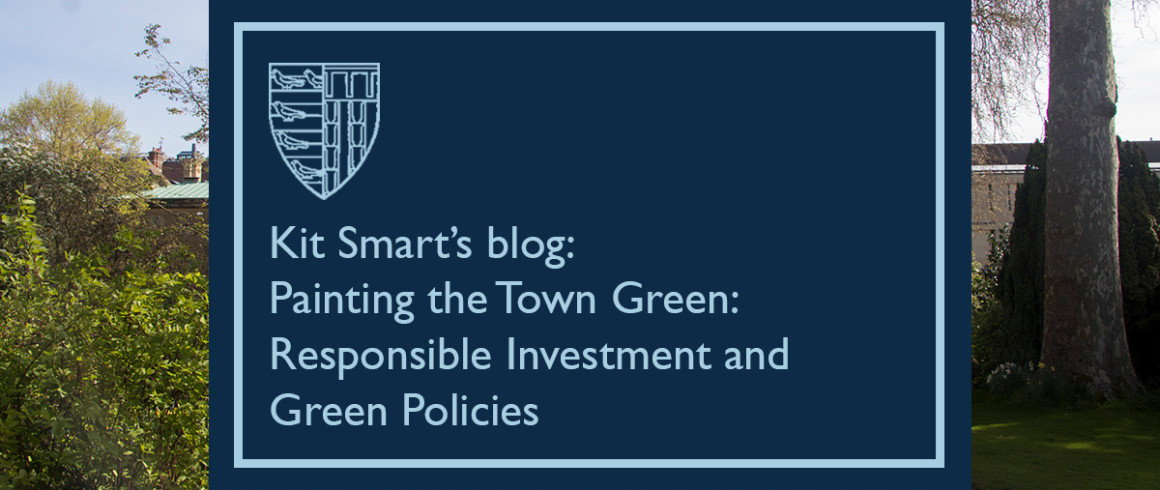Painting the Town Green: Responsible Investment
 Ethical investments is a complicated field but one that is very much worth taking the time to understand, and build policies around.
Ethical investments is a complicated field but one that is very much worth taking the time to understand, and build policies around.
To this end, Andrew Cates, Pembroke’s Bursar, spent Thursday morning at a Responsible Investment Forum hosted by Positive Investment Cambridge. Bursars from 16 different colleges came together with fund managers and representatives from Environment Social and Governance groups to discuss possibilities from solar panels to investment policies. The meeting ranged from responsible investment, through the complexities of the investment market and the limitations of the older College buildings. Thank you to the Bursar for his account of the morning.
Yesterday I spent the morning at a “Responsible Investment Forum” run by Positive Investment Cambridge, a student led group who have very much the most credible and effective dialogue with the Colleges on Ethical Investments. From the Cambridge side, 16 bursars came; getting 16 bursars in a room is more of an achievement than it seems, and reflects considerable interest for the subject (although in investment terms the USS representative and Trinity rather dwarfed the rest of us). A variety of fund managers and “ESG” (Environment Social and Governance) groups came along to talk to us and each other about the challenges of ensuring that we are responsible investors.
The day was split into three sessions: environmental investments in medieval buildings; Red Line Voting; and investment policy. The first session, looking at environment investments in medieval buildings, highlighted challenges faced by the Colleges. The University itself has much to do, and Estates Management were represented as well. A couple of years ago, Positive Investment Cambridge has suggested the use of revolving Green Bonds as a means of paying for environment improvements, and this time invited Suzanne Buchta, Global Head of Green bonds in Bank of America Merrill Lynch to talk about this rapidly growing market. This was of interest as an investment area, but those present identified a problem of scale in Cambridge: there are a lot of badly insulated buildings but they are very diverse and with each it is difficult to know in advance exactly what the cost and saving of insulation, for example, might be. This makes “packaging” improvements up for investors very difficult.
Solar investment schemes work better (in that the gain was predictable and it was possible to “Pay as you save” via metring) but many Solar PV opportunities had already been taken (for example, Foundress Court has Solar PV installed over much of it) and old roofs are unsuitable. Phil Caroe, Director of Impact Finance at Allia, also explained the possibility of financing green investments directly from the Retail investment market rather than from Private Equity, which allowed much smaller and shorter term sums to be raised (albeit at a higher cost). There was some discussion about whether all Colleges had taken the low hanging fruit on environmental improvements such as solar and draft exclusion, and whether if there were opportunities we might finance each other rather than going to the open market.
Out of curiosity, Pembroke initially considered the new, more efficient boiler and insulated underground distribution system put in last summer as a possible Green Bond investment – after being prodded by Positive Investment Cambridge – but we decided to against this because of the difficulty in separating environmental benefits from other gains (in particular having warmer rooms for our students).
The second session was on Red Line Voting, which is an attempt to deal with a big problem in ethical investment management; a large part of investment is in pooled funds which by definition have shares in every company, and although actively investing in good companies can work well, divestment as a strategy is widely regarded as a bit of a chocolate teapot. Influencing companies positively through voting is more beneficial than divesting from them and leaving ownership in the hands of shareholders with fewer scruples. The Red Line Voting scheme was set up by the Association of Member Trustees (who are typically people who sit on the boards of Pension Funds), and looks at about 30 different ethical and environmental assessments of company behaviour such as whether companies always publish environmental impact reports on major investments, and if they have a board member or committee responsible for environment issues. Fund Managers who sign up do not have to follow the voting advice of the Red Line rules, but have to publish their reasons for not doing so, which has proved to be an effective approach.
Legal & General (Nancy Kilpatrick) explained that they had a policy of “voting every share” to try to exert maximum pressure on ethical behaviour; as holders of around 4% of the total UK stockmarket, their influence is considerable. Blackrock cited the recent example of the pressure they had brought to bear on Exxon Mobil to improve Climate Change consideration. However, it is by no means a simple or easy way to ensure responsible investment; USS commented that practically it was very hard to track the actual voting done by fund managers because it often arrived in a format of dozens of pages of one lines saying “we voted against motion 242 in the AGM of XYZ2”, and one College commented that in reality it would always be difficult to justify choosing a tracker fund which charged 9 basic points and engaged as a shareholder over one which charged 7 and did not. Everyone agreed that sustainable and ethical policies made good business sense for long term investors like Colleges in any case.
The third session dealt with ethical investment policy and discussed a draft which Kings and Pembroke are planning to adopt (although this is still with our junior members).
All in all a very positive day, with progress on lots of fronts. Thanks again to Positive Investment Cambridge for arranging an impressive morning.
